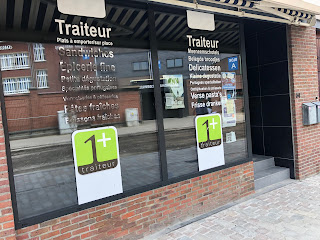It is a simple square with a 19th-century
tower dominating the center in a nice neighborhood in Barcelona, surrounded by
four and five-story buildings. Catalonian flags and banners hang from several
windows. The sky is crystal clear; the trees are iridescent green. About a
dozen oranges almost glow in the setting sun on a puny tree that is growing
next to building 38. It is warm, but not hot. Can one imagine a more perfect
evening?
My colleagues send me a message
apologizing for being late, but I am content to sit and watch people. When we
travel people become a blur. Sometimes we do not consider that there are
residents of the places we visit. If you want to know if people are people,
then sit here for a few minutes, or several, and observe.
 |
| Plaça de la Vila de Gràcia, Barcelona |
Three cafés set up tables around
the edges of the square, where people are enjoying a drink, conversation, and
music provided by a steel drum and guitar duo. Included in their repertoire are
standards such as “Yesterday” and “All of Me.” No one is actively listening to
the duo, but it provides ambience to the evening.
If adults occupy the cafés and
edges of the square, then children dominate the center. A group of boys
earnestly engage in a frenetic game of football (soccer), using the door of the
tower, damage in the revolt of 1870, as a makeshift goal. The pitch seems to be
the entire square and occasionally extends into the tables and benches that
line the plaça. Despite the conquest of square by children, adults are there as
well. A father and grandfather teach a young brother and sister how to ride a
skateboard, with each adult taking a turn in demonstration. Suddenly, an
American football appears across the way from me. A woman has brought it to
entertain those too young to engage in the soccer game.
There is a nationalist battle
between the Spanish and Catalan languages in Barcelona, but the predominant
language on t-shirts here is English. One boy has a NYPD shirt, which seems out
of place because there is not a police officer in sight, and no need for any
their services. A little girl has an aqua blue shirt with sea turtles,
imprinted with the words, “Explore the Ocean.” A middle age man with shorts and
sunglasses is wearing a shirt that suggest to the reader, “Go Surfing.” Where,
I wonder, are the shirts in the local languages?
Some adults cross the square
without fear. Old women with canes navigate the games and people seemingly
impervious or oblivious to the hectic feel of the evening. Unconsciously, the
soccer ball steers clear of the elderly women. Others are crossing the square
evidentially coming home from work. I like to think that they traverse the
plaça to see what is happening in the neighborhood or to be seen. Perhaps not,
but I am willing to bet that I observed several people take a quick scan to see
if friends or family might be there.
I share the bench with a woman
sitting at the opposite far end reading a literary magazine, although she is
occasionally distracted from her endeavor. During my repose, we have several
who occupy the middle space between us: two older women eating ice cream, a
young mother catching up with a friend, and a man stopping to check the
messages on his phone. It is a joyful evening, not a holiday and not the
beginning of a weekend. It is not planned and is very public. It is not a
gathering of friends, but the gathering of a community. I wonder to myself,
were this plaça outside my house or apartment would I be the participant-observer
I am now? Would I take the time to sit and observe? Would I read my book or
newspaper outside?


